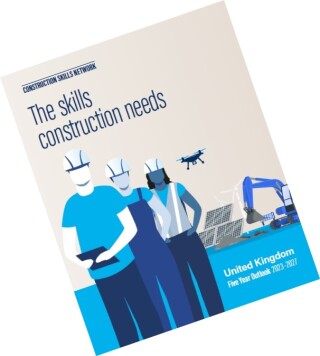The Construction Industry Training Board (CITB) 2023 Construction Skills Network (CSN) report says that 224,900 extra workers will be needed to meet UK construction demand between now and 2027, at an average of 44,980 new entrants a year.
That total is 15% lower than what the 2022 report said, which was 53,200 a year to 2026.
If projected growth is met, by 2027 the number of people working in UK construction will be 2.67 million, the report says.
Although personnel requirements have softened, recruitment, training, development and upskilling remain major priorities for the industry for 2023 and beyond, the CITB asserts.
Annual average growth rate of the construction workforce will be 0.1% to 2027, although certain roles are expected to have higher growth rates – 1.9% a year for architects, 1.2% for civil engineers and 1.1% for plant operators, the authors have calculated. Construction professions are projected to see an annual average growth of 1.2% from 2023-2027, compared with -0.2% for the trades and elementary occupations.
Chief executive Tim Balcon write in the foreword to the report: “Construction companies have faced significant input cost inflation from supply chain disruptions, high energy costs, and soaring wage bills caused by worker shortages. However, construction output has performed better than expected, with estimated annual growth of around 4% during 2022. With GDP declining through 2023 and possibly into 2024, it is unlikely that construction will continue to out-perform the economy. The overall output growth rate will, as a result, average 1.5% per year between 2023 and 2027, a reduction on the 3.2% rate in the 2022-2026 outlook.

“As the recession is likely to be shallower in terms of declines in GDP than seen in 2008 and 2020, the forecast has a decline in UK construction output for 2023 of -0.5%. There is a return to growth in 2024 through to 2027, with the commercial, infrastructure and industrial sectors looking set to weather the downturn slightly better than new housing or housing repair and maintenance.

“The construction industry still has a long-term challenge in recruiting workers with high levels of job vacancies and low levels of unemployment likely to persist. Recruiting and developing the workforce for the future remains vital to ensure the industry can contribute to growth, such as building the homes the country needs, the infrastructure for energy and transport and retrofitting the built environment to meet net zero targets. With vacancies set to remain high, it is important that construction companies make use of support to continue recruiting, training and developing the workforce needed for coming years.
“As the recession, high costs and interest rates bite, it is critical to ensure the industry doesn’t lose workers and continues to invest in skills for when the recovery is felt. CITB is responding to these challenges by investing in apprenticeships, launching a range of innovative initiatives and working collaboratively with industry, to support it to have a skilled, competent, and inclusive workforce now and in the future.”
The full 45-page report can be found via www.citb.co.uk
Got a story? Email news@theconstructionindex.co.uk



